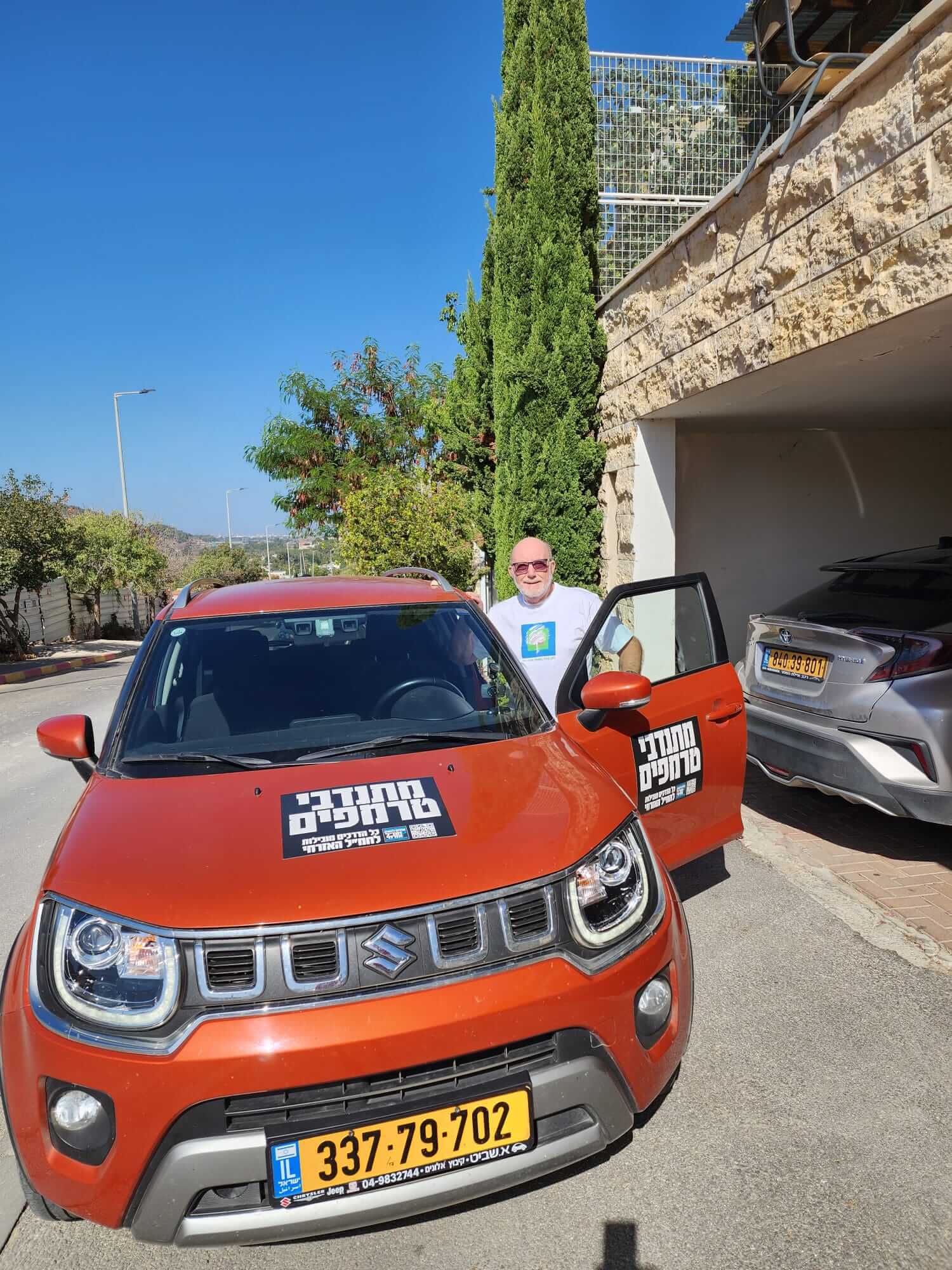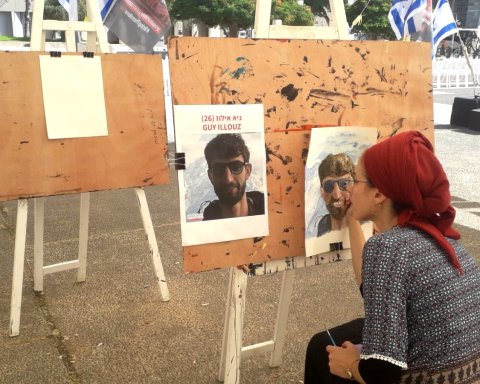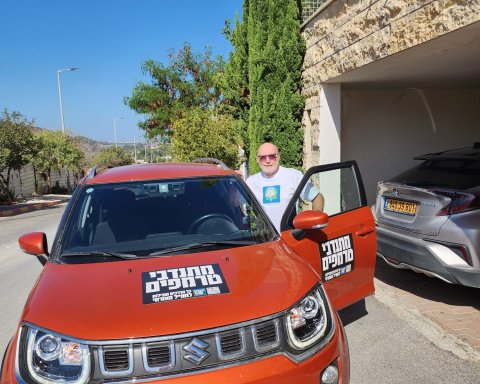This time we are meeting Henry Jakubowicz who is originally from Dortmund, Germany, who came to Israel in 1995.
Tell us a little bit about yourself!
I was born on August 10th, 1971 in Dortmund. My mother grew up in Israel and was the Israeli-Zionist influence. My father is a Shoah survivor from Poland and a pro-religious-Jewish influence.
My father came from Poland and survived the Shoah as a child, then ended up in Germany via Vienna. My mother was born in Poland after the Shoah and grew up in Israel from the age of 2. Her father survived Auschwitz and her mother, originally from Sziget (Hungary / Romania), survived Bergen Belsen and somehow I was born in Dortmund… I have two sisters, one still lives in Dortmund, the other not so far away in Düsseldorf.
I’m single (Editor’s note: the photo shows Henry with his sister) and I live in Tel Aviv – Israel. I am a religious person in the state of Israel, living in the middle, in between, and sometimes next to it – it is best not to try to define it at all!
When did you come to Israel?
My official Aliyah date is September 22nd, 1995 but I came to Israel already a year prior to that in 1992/1993.
Why did you come here?
I didn’t leave Germany because of anti-Semitism or because of the cold. I wanted to come to Israel simply because of the zionistic idea that every “people” has a home and now is the right time for me. So I saw that as something exciting, following my own truth and being positive!
What do you do for a living and how did you get into it?
I’ve been in tourism for over 20 years and focus mainly on bringing tourists to Israel so they can experience Israel in all its facets….
Where did you first live when you came here and where else did you live here?
I got off to a very easy start with the logistical issues, as I moved into a shared apartment with a friend straight away. I started in Tel Aviv and we were quite a large group of Olim (immigrants) at the time. From a logistical point of view, all went very smoothly, probably because I could speak Hebrew quite well… of course there were challenges here and there, but I didn’t have to adapt too much. I did, though, need to work on my habits and that took some time with some ups and downs, but a lot more ups in the end.
Did you go to the army?
Since I was already older (in my mid-twenties) I didn’t have to do the whole army service, but rather a short one. In the beginning, after basic training, I was in the artillery, but then later switched to the IDF International Press Secretary Unit and was there for the withdrawal from the Gaza Strip in 2005. It is part of Israel and there I learned a lot about the diversity of Israeli society and the IDF is part of the DNA of Israel! It was a very important and positive experience for me and my Aliya!
Are you politically or socially active?
I don’t think there is anyone who is not politically “active” in Israel and who expresses his or her opinion whether at work, social media or at the Shabbat table. You can hardly be apolitical in Israel… I have always fancied joining a party, and shortly did so as a Likud member. I tend to be somewhere in the center-right; there is no party that matches my political affiliation totally or 100%. Israel and politics are very important to me and there is still a lot to do here… I still don’t have the means and time… but I would like to have a say in the future…
What do you miss about Germany?
Germany is the place where I was born and I took the first breath in my life. I was able to take a lot of good things with me for what I am very grateful for. I do miss the cold rain in summer and sometimes clear structures.
How is your relationship with Germany and has anything changed in the relationship since you have been here?
Germany has had its place with me as my place of birth, but never as my home. This conflict is resolved today. Israel is my home and Germany is the country in which I was born and where I was able to enjoy a good first education. Today it is clear and without conflict. This question used to be very stressful for me.
What do you love about Israel?
I have invested a lot of effort in trying to understand Israel… I have gotten better and some things have become clearer to me, but this country has too much energy, too many facets, and too much of a lot that I do not yet understand. Israel is “home” today, and I love that I can get annoyed like nowhere else in the world, but also laugh and experience things like nowhere else.
What do you think can be improved here in Israel?
Israel has some challenges! I think we have to learn to breathe and not just to run from one challenge to the next. Now we are almost 10 million inhabitants here and we have to see how we all can and want to live together here… I have the feeling that this question and clarification of our own identity could give us some rest that will give us some peace of mind.
What do you love about your city?
Tel Aviv is the city that welcomed me and since then I have lived in many parts of the city and basically called many cafes my home. Tel Aviv was a very good introduction to the country for me, without necessarily having to experience everything that the Tel Aviv lifestyle entails. But it is a city that has a zest for life and it is difficult for her to be closed for 25 hours on Yom Kippur… the promenade and the beach and not worrying about what the neighbor thinks is a good feeling. When I see the first lines of the streets of Tel Aviv by plane, I think… this is the city I know and in which I live… whether I will stay here forever, I am not sure yet. But she welcomed me very well! Toda 😉
The media always focuses on the conflict between Arabs and Israelis. Do you know an example of peaceful coexistence from everyday life that gives hope for the future?
Even in Tel Aviv around 10% of the population are Israeli-Arabs. The Israeli national soccer team has 5 Israeli-Arab players and in the Israeli Parliament, there are 15 Israeli-Arab Knesset members… I think one of the reasons why we sometimes argue so hard, is because we are from the same family of Abraham / Ibrahim. We can do this, Inshallah!!!
What anecdote comes to mind that can only happen here.
In Israel, you can find prices that do not even exist. 5.76 NIS there are no “cents” in Israel, but there were the prices and somehow it didn’t bother anyone but me. I pondered about it for years… why either this currency does not exist or it is not abolished? Until I have learned “ze ma yesh” (= that’s the way it is) and live on… it will be settled…
What’s your favorite word in Hebrew?
“Toda raba” = Thank you very much! People love to hear it and it calms everyone down for a few seconds.
If you were to make aliyah (immigrate to Israel) over again, what kind of tips would you give yourself, with the knowledge you have accumulated today?
Many questions are of a technical nature and will be solved plus/minus over time. I slightly underestimated the phase of mental-emotional adjustment and that takes a little longer than I expected… My first phase of the Aliyah process was about 8 years. I noticed that I no longer followed the ATM instructions in English, or I suddenly asked for an Israeli newspaper instead of “Die Welt” on the plane… As I said, that was the first phase…
Where do you feel at home?
Sorry, I am not your average little romantic Zionist… but I can’t say no to shawarma with lafa at “Faruk” in Or Yehuda with charif (= spicy), hummus chips in all you can eat buffet… for me, this is home sweet home!





